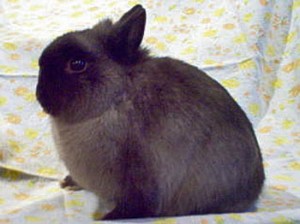There are two names for this variety, sable and Siamese sable.

General Description
Sable rabbits have dark sepia ears, face, legs, and the upper side of their tail. The saddle (upper part of the back) is also dark sepia which gradually shades to a lighter sepia. The face is darkest at the muzzle and eyes and gradually shades to a lighter color. The chest, sides, belly, inside of legs, and the underside of their tail are light sepia.
Surface Color
Dark sepia points and saddle with light sepia shading.
Under Color
The under color will be slightly lighter than the surface color, but should match the surface color as closely as possible.
Toenails and Eyes
Toenails should be pigmented and be uniformly colored on both front feet and both hind feet, and match as closely as possible. Eyes are brown and may have a ruby glow in low light.
Breeds That are Showable in the Sable Variety
Sable
American sable, English angora, French angora, satin angora, English lop, French lop, mini lop, and rex.
Siamese Sable
American fuzzy lop, Holland lop, Jersey wooly, and Netherland dwarf.
Exceptions to the General Description
English angoras, French angoras, and satin angoras will be a lighter color in wooled areas.Guard hairs on the saddle to match the normal furred areas.
General Faults
Molting or hutch stained rabbits, stray white hairs, light eye color. Blotchy or streaky shading. Lack of gradual shading, causing clean breaks between colors. Absence of dark saddle color. Rusty or mealy appearance. Very light or very dark color.
American Sable Faults
Shadow bars on legs, white whiskers, and light under color are faulted.
General Disqualifications
Eye color other than brown or unmatched eyes. Unmatched toenails or white toenail(s). Rabbits which completely lack shading, looking like selfs. White or foreign colored spots, excessive amounts of scattered white hairs.
American Sable Disqualification
American sables will be disqualified for eyes without a ruby glow.
